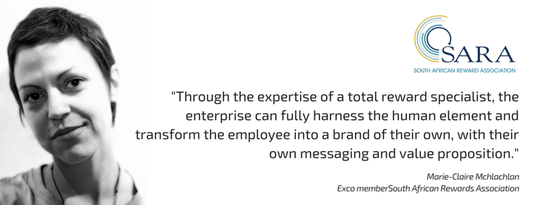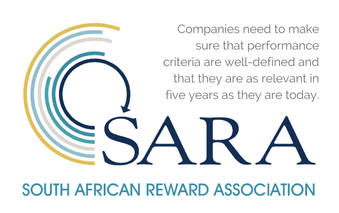|
Employee engagement has become synonymous with productivity and passion and a healthy bottom line. “Employee engagement boils down to positive emotional associations and trust in an organisation,” explains Marie-Claire Mclachlan, South African Rewards Association (SARA) exco member.
An engaged employee outperforms the average with a commitment to the organisation which goes beyond the salary and into the personal. Research undertaken by Gallup has shown that organisations which increase the number of talented managers and double the rate of engaged employees achieve, on average, 147% higher earnings per share. And yet, the same research has shown that only 13% of employees are engaged worldwide. “To build this, to truly engage with the employee, it’s valuable to have a total reward specialist on board who can keep up to date with what the science is saying when it comes to total reward and engagement and who knows how to implement in the right way,” says Mclachlan. A specialist insight The rules of employee engagement have changed significantly over the past few years and yet many companies continue to use old total reward practices which have the opposite effect to the positive intent. This is largely because the older methodologies were structured around the command-and-control industrial-era organisational setting as opposed to today’s workplace realities. “A total reward specialist is able to instantly assess whether or not the systems in play are counterintuitive and how to address these so as to ignite employee engagement,” says Mclachlan. “Their value is found in their understanding of how best to engage with an employee within a specific environment using the latest research and tools. Their skills also ensure the organisation’s total reward efforts, including remuneration and benefits, are structured properly and that motivational drivers across employee ages and stages are properly taken into account.” While it may sound like a lot of effort just to tick a corporate box, there are tangible results linked to an engaged workforce. A Cvent survey found that customer retention rates are 18% higher on average and further research by the Temkin Group established that engaged employees were 2.5 times more likely to stay late if required, twice as likely to offer help and more than three times as likely to do something good for the company without being asked. A business value “Engaged workforces mean greater employee satisfaction, an increase in customer satisfaction and lower rates of attrition,” says Mclachlan. “Amongst the many benefits, organisations hold onto talent for longer, they experience lower accident and safety incidents and there is a measurable, positive impact on the bottom line.” Through the expertise of a total reward specialist, the enterprise can fully harness the human element and transform the employee into a brand of their own, with their own messaging and value proposition. “The employer brand works in exactly the same way as the consumer brand. You can have a fantastic value proposition but fail in delivering the promise. Like most things, it comes down to the execution and how the business delivers on its total reward promises will impact engagement,” concludes Mclachlan. “There is a need to empower management by giving them the skills they require to engage with employees properly and to use the organisation’s total reward tools effectively. Poor management and bad communication will only serve to damage any plans put in place, and a total reward specialist can ensure this is addressed in the right way to deliver the right results.” ENDS MEDIA CONTACT: Cathlen Fourie, 012 644 2833, [email protected], www.atthatpoint.co.za For more information on SARA please visit: Website: www.sara.co.za Twitter: @SA_reward LinkedIn: South African Reward Association Facebook: SARA – South African Reward Association
0 Comments
Establishing the parameters of executive compensation within an organisation is a complex task. The board needs to craft a package which is in line with business strategy and performance and which is of significant value to the executive, or there is a risk that value is lost by both. Compensation is a tool which can be managed to align company success with executive deliverables so as to benefit the bottom line and inspire business executive performance.
Reward expert, Laurence Grubb, Exco member of the South African Reward Association (SARA) explains: “There are three basic types of long term incentive schemes which align shareholders and executive interests and work best over a period of between three to five years.” Performance share/unit scheme This type of scheme offers the executive shares or ‘full value’ units which are linked to the value of the company. The total value of the shares or units offered is aligned to the value of the executive’s package. When these vest (become available to the executive), the performance of the company is compared to the performance objectives set at the time they were offered and this determines the number of shares or units that vest and the executive receives the full value. “The executive is therefore driven to improve the share price or unit value and to ensure the company meets or exceeds the performance objectives set,” explains Grubb. Share option/appreciation unit/rights scheme This is similar to the previous scheme but instead of full value units, the executive is offered options/units/rights where they benefit from only the growth in the value. So they only receive the difference between the value at vesting and the value at commencement. There may be performance objectives attached to the vesting or a hurdle, such as a minimum level of company performance, below which nothing vests. These schemes should ignite executive commitment as benefits are closely tied to the success of the business. “The challenge with this type of solution is that the share price can be impacted by factors outside of the executive’s control and it can be tricky to set the performance measures today for market conditions and organisational objectives in three to five years,” says Grubb. Share Purchase Schemes “The third type of scheme aligns executive interest with shareholder interest. Executives are asked to invest their own money into shares so they are completely engaged with the shareholder vision.” “The ways in which the schemes are structured depend on who the shareholders are and what they prefer, the executives and the expertise within,” says Grubb. “Some companies have their own reward departments with specialists on board to advise them. In other instances executives seek the expertise of outside consultants on how best to construct and manage their packages. In both cases it is essential that the final package align with company strategy and ensure executive buy-in.” “Linking incentive to reward and reward to performance is an art form and many companies and reward specialists spend a good deal of time and effort in identifying and implementing the best solutions for their business,” concludes Grubb. “You need to define performance and establish which measures – financial and other – evaluate that performance. Companies need to be focusing on making sure that performance criteria are well-defined and that they are as relevant in five years as they are today.” ENDS MEDIA CONTACT: Cathlen Fourie, 012 644 2833, [email protected], www.atthatpoint.co.za For more information on SARA please visit: Website: www.sara.co.za Twitter: @SA_reward LinkedIn: South African Reward Association Facebook: SARA – South African Reward Association |
Archives
March 2023
Welcome to the South African Reward Association newsroom.
Categories
All
|



 RSS Feed
RSS Feed